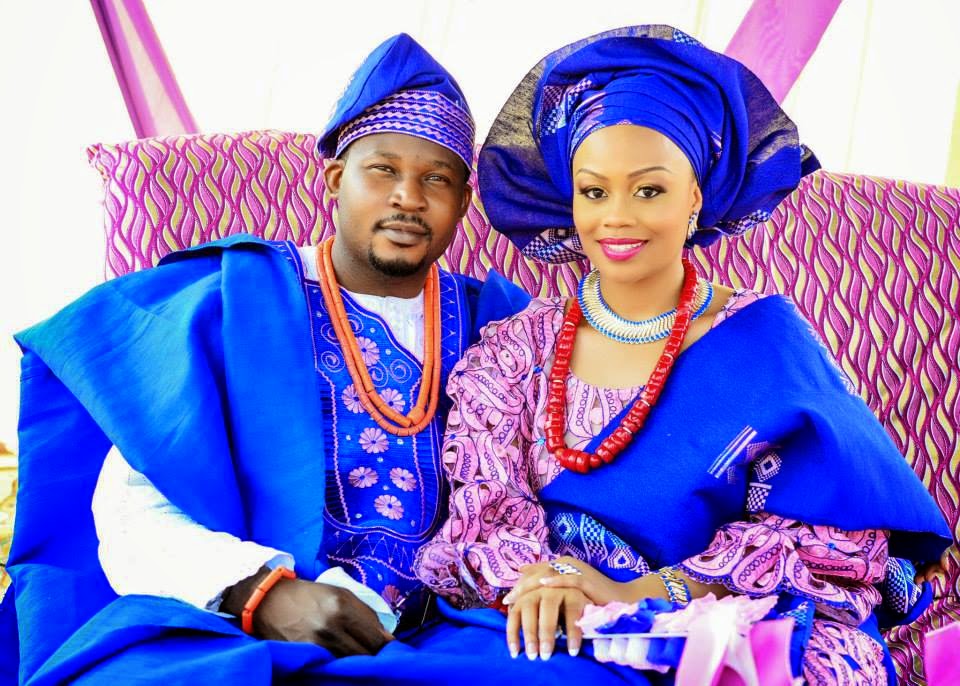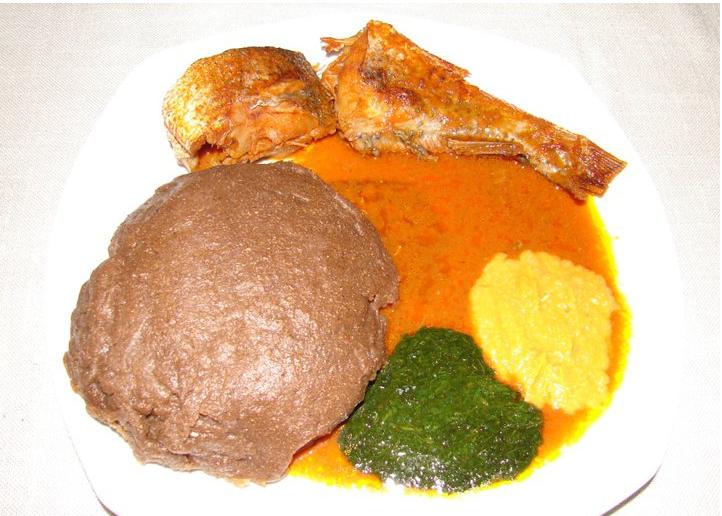
1 • INTRODUCTION
The Yoruba are one of the largest African ethnic groups south of the
Sahara Desert. They are, in fact, not a single group, but rather a
collection of diverse people bound together by a common language,
history, and culture. Within Nigeria, the Yoruba dominate the western
part of the country.
Yoruba mythology holds that all Yoruba people descended from a hero
called Odua or Oduduwa. Today there are over fifty individuals who claim
kingship as descendants of Odua.
During the four centuries of the slave trade, Yoruba territory was known
as the Slave Coast. Uncounted numbers of Yoruba were carried to the
Americas. Their descendants preserved Yoruba traditions. In several
parts of the Caribbean and South America, Yoruba religion has been
combined with Christianity. In 1893, the Yoruba kingdoms in Nigeria
became part of the Protectorate of Great Britain. Until 1960 Nigeria was
a British colony and the Yoruba were British subjects. On October 1,
1960, Nigeria became an independent nation structured as a federation of
states.
2 • LOCATION
The Yoruba homeland is located in west Africa. It stretches from a
savanna (
grassland) region in the north to a region of tropical rain
forests in the south. Most Yoruba live in Nigeria. However there are
also some scattered groups in Benin and Togo, small countries to the
west of Nigeria. The occupations and living conditions of the Yoruba in
the north and south differ sharply.
Current census figures are difficult to obtain. The Yoruba population is
estimated to be 5.3 million.
3 • LANGUAGE
The Yoruba language belongs to the Congo-Kordofanian language family.
Yoruba has many dialects, but its speakers can all understand each
other.
Yoruba is a tonal language. The same combination of vowels and
consonants has different meanings depending on the pitch of the vowels
(whether they are pronounced with a high voice or a low voice). For
example, the same word,
aro
, can mean cymbal, indigo dye, lamentation, and granary, depending on
intonation.
Pele o
is "Hello";
Bawo ni?
is "How are you?"; and
Dada ni
is "Fine, thank you."
4 • FOLKLORE
According to a Yoruba creation myth, the deities (gods) originally lived
in the sky with only water below them. Olorun, the Sky God, gave to
Orishala, the God of Whiteness, a chain, a bit of earth in a snail
shell, and a five-toed chicken. He told Orishala to go down and create
the earth. Orishala approached the gate of heaven. He saw some deities
having a party and he stopped to greet them. They offered him palm wine
and he drank too much and fell asleep. Odua, his younger brother, saw
Orishala sleeping. He took the materials and went to the edge of heaven,
accompanied by Chameleon. He let down the chain and they climbed down
it. Odua threw the piece of earth on the water and placed the five-toed
chicken upon it. The chicken began to scratch the earth, spreading it in
all directions. After Chameleon had tested the firmness of the earth,
Odua stepped down. A sacred grove is there today.
5 • RELIGION

As many as 20 percent of the Yoruba still practice the traditional
religions of their ancestors.
The practice of traditional religion varies from community to community.
For example, a deity (god) may be male in one village and female in
another. Yoruba traditional religion holds that there is one supreme
being and hundreds of
orisha,
or minor deities. The worshipers of a deity are referred to as his
"children."
There are three gods who are available to all. Olorun (Sky God) is the
high god, the Creator. One may call on him with prayers or by pouring
water on kola nuts on the ground. Eshu (also called Legba by some) is
the divine messenger who delivers sacrifices to Olorun after they are
placed at his shrine. Everyone prays frequently to this deity. Ifa is
the God of Divination, who interprets the wishes of Olorun to mankind.
Believers in the Yoruba religion turn to Ifa in times of trouble.
Another god, Ogun (god of war, the hunt, and metalworking), is
considered one of the most important. In Yoruba courts, people who
follow traditional beliefs swear to give truthful testimony by kissing a
machete sacred to Ogun.
Shango (also spelled Sango and Sagoe) is the deity that creates thunder.
The Yoruba believe that when thunder and lightning strike, Shango has
thrown a thunderstone to earth. After a thunderstorm, Yoruba religious
leaders search the ground for the thunderstone, which is believed to
have special powers. The stones are housed in shrines dedicated to
Shango. Shango has four wives, each representing a river in Nigeria.
The Yoruba who practice other religious are divided about evenly between
Muslims (followers of Islam) and Christians. Nearly all Yoruba still
observe annual festivals and other traditional religious practices.
6 • MAJOR HOLIDAYS
Local festivals are usually dedicated to individual deities. Yoruba may
also celebrate the following holidays, depending on whether they are
Christians or Muslims: New Year's Day, January;
Eid al-Adha
(Feast of Sacrifice), June or July; Easter, March or April;
Maulid an-Nabi
(Muhammad's birthday); Ramadan, followed by a three-day feast;
Nigerian Independence Day (October);
Eid al-Fitr
; Christmas (December).
7 • RITES OF PASSAGE
A newborn infant is sprinkled with water to make it cry. No word may be
spoken until the infant cries. Also, no one younger than
the mother should be present at the birth. The infant then is taken to
the backyard. The umbilical cord is bound tightly with thread and then
cut. The
placenta is buried in the backyard. On the placenta burial
spot, the child is bathed with a
loofah sponge and rubbed with palm oil.
The child is held by the feet and given three shakes to make it strong
and brave. After a specified number of days, a naming ceremony is held.
Relatives attend and bring small amounts of money. Male and female
circumcision are usually performed in the first month.
Marriages are arranged. A man must negotiate with the girl's
father. If he is approved he must bring the family a payment called a
bride wealth, paid in three installments. Wedding ceremonies begin at
the bride's house after dark. There is a feast to which the groom
contributes yams. The bride then is taken to the groom's house.
There she is washed from foot to knee with an herbal mixture meant to
bring her many children. For the first eight days after marriage she
divides her time between her husband's and in her parents'
compounds. On the ninth day she moves to her husband's home.
Burials are performed by the adult men who are not close relatives but
belong to the clan of the deceased. The grave is dug in the floor of the
room where the deceased lived.
After the burial there is a period of feasting. Many of the rituals
associated with burial are intended to
insure that the deceased will be
reborn again.
8 • RELATIONSHIPS
Kinship is the most important relationship for the Yorubas. Best friends
are very important as well. A best friend is referred to as
"friend not-see-not-sleep." This means that one does not
go to sleep without having seen his best friend. When approaching death,
a Yoruba shares his last wishes with his best friend.
Also important are clubs that grow out of childhood associations. When a
group of young friends starts spending time together, they form a club.
They choose a name and invite an older man and woman to serve as
advisors. The clubs continue through adulthood. They hold monthly
meetings, with the members serving as hosts in turn.
9 • LIVING CONDITIONS
Traditional compounds (which house clans) in Yoruba villages are made up
of rectangular courtyards, each with a single entrance. Around each
courtyard is an open or a partly enclosed porch. Here the women sit,
weave, and cook. Behind this are the rooms of each adult. Today the old
compounds are rapidly being replaced by modern bungalows made of cement
blocks with corrugated iron roofs. Most Yoruba towns, even small ones,
have adequate basic services, including electricity, running water, and
paved roads.
10 • FAMILY LIFE
Every Yoruba is born into a clan whose members are descended from a
common ancestor. Descent is patrilineal—both sons and daughters
are born into the clan of their father. Clan members live in a large
residential area called a compound. The males are born, married, and
buried in it. Females live in the compound of their birth until they
marry. Then they go to live with their husbands. The eldest male, or
Bale,
is the head of the compound. A husband is responsible for settling
quarrels within his own family. However, if he is unsuccessful or if an
argument involves members of two different families, it is referred to
the Bale.
Within the compound, the immediate family consists of a man, his wives,
and their children. The Yoruba practice polygyny (having more than one
wife). Each wife and her children are considered a sub-family. They have
a separate room within the husband's and they share possessions.
Each mother cooks for her own children only. A man is expected to treat
each wife equally. However, wives compete to gain additional favors for
their own children. The father is strict and distant. Often, he sees
little of his children. When they are young, children of co-wives play
together. However, as they grow older, they usually grow apart because
of quarrels over possessions.
11 • CLOTHING

Western-style dress is worn in urban areas. Traditional clothing is
still worn on important occasions and in rural areas. It is very
colorful and elaborate. Traditional fabrics were block printed with
geometric designs. Women wear a head tie made of a rectangular
piece of fabric. They carry babies or young children on their backs by
tying another rectangular cloth around their the waists. A third cloth
may be worn over the shoulder as a shawl over a loose-fitting,
short-sleeved blouse. A larger cloth serves as a wrap-around skirt.
Recipe
Fufu (Pounded Yam)
Ingredients
Choose one of these:
-
3 or 4 white yams, preferably round and fat
-
3 or 4 orange yams
-
1 bunch plaintains
-
1 bunch green (unripe) bananas
Directions
-
Peel the vegetable or fruit of choice and cut into chunks or slices.
Place the pieces into a pot and cover with water.
-
Cover the pot and heat until the water boils. Cook until the yams
(plaintains or green bananas) can be pierced easily with a fork.
-
Drain well and place one or two pieces into a large mortar and
pestle. Pound the pieces until a mass is formed that pulls away from
the sides of the mortar. (This cannot be done with an electric
mixer, because the pounded yams will be very stiff.)
Fufu is served with soups and stews at main meals. Diners pinch off a
piece of fufu, make an indentation in it, and use it as a spoon to
scoop up a mouthful of the main dish.
Chicken and Okra Soup
Ingredients
-
6 to 10 chicken legs or wings
-
1 small onion, chopped
-
18 large okra, chopped
-
1 teaspoon dry ground red pepper
-
1½ ounces (40 grams) dry crayfish, ground
-
2 medium fresh tomatoes
-
2 teaspoons tomato paste
-
Pinch of salt
-
½ teaspoon potash
Directions
-
Place the chicken in a pot with salt and pepper, cover with water
and boil until tender. Drain, reserving broth for next step. Remove
meat from bones and cut into bite-sized chunks.
-
Combine okra with reserved broth and remaining ingredients. Boil for
5 minutes. Add chicken and continue to cook for 5 minutes more.
Serve with fufu.
Men wear tailored cloth hats, gowns, and trousers. One popular type of
gown is shaped like a poncho. It reaches to the fingertips, but is worn
folded back on the shoulders. Trousers are usually very loose and baggy.
All the cloth for traditional clothing is hand woven. Often it is
elaborately embroidered.
12 • FOOD

The Yoruba diet consists of starchy tubers, grains, and plantains. These
are supplemented by vegetable oils, wild and cultivated
fruits and vegetables, meat, and fish. The daily family diet relies on
cassava, taro, maize, beans, and plantains. One of the most popular
foods is
fufu
(or
foo-foo
), similar to a dumpling, but made of cassava (white yams). Rice and
yams are eaten on special occasions.
The recipes are very popular and are usually served together.
13 • EDUCATION
Since attaining independence (1960), Nigeria has set a high priority on
education. Universal primary education has become the norm in southern
Nigeria, where the Yoruba live. Secondary school (high school) education
also became common. The first university in Nigeria was located in a
Yoruba city. Originally called University College, it is now known as
the University of Ibadan. The majority of students at Ibadan are Yoruba.
14 • CULTURAL HERITAGE
The Yoruba oral tradition includes praise poems, tongue twisters,
hundreds of prose
narratives and riddles, and thousands of proverbs.
Yoruba music includes songs of ridicule and praise, as well as
lullabies, religious songs, war songs, and work songs. These usually
follow a "call and response" pattern between a leader and
chorus. Rhythm is provided by drums, iron gongs, cymbals, rattles, and
hand clapping. Other instruments include long brass trumpets, ivory
trumpets, whistles, stringed instruments, and metallophones. Perhaps the
most interesting musical instrument is the "talking drum."
The "talking drum" features an hourglass shape with laces
that can be squeezed to tighten the goatskin head, altering the
drum's pitch.
15 • EMPLOYMENT
About 75 percent of the Yoruba men are farmers, producing food crops for
their domestic needs. Farming is considered men's work. Clearing
or hoeing fields is done only by men. Wives help their husbands plant
yams and harvest corn, beans, and cotton. They also help at the market,
selling farm produce. Some Yoruba have large cocoa farms worked by hired
labor.
The Yoruba enjoy trading. Huge markets with over a thousand sellers are
common. Trade in foodstuffs and cloth is confined to women. Meat selling
and produce buying are the province of men.
The new, educated generation is moving away from farming, and its
members are looking for white-collar jobs.
16 • SPORTS
Although there are few organized sports, Yoruba (like other Nigerians)
in some areas participate in wrestling and soccer.
17 • RECREATION
Traditional entertainment includes rituals, dancing, and music making.
Modern forms of entertainment include watching television and going to
movies and discos. Most households own televisions sets. The more
religious households prohibit family members, especially women, from
going to see films. Among urban teenagers, American youth culture is
popular. Most young people listen to rap and rock music from the U.S.
Ayo, a board game, is popular among people of all ages. It is a mancala
game—a type of game popular in west Africa, that is played on a
board with two rows of indentations or wells that are filled with small
seeds or stones.
18 • CRAFTS AND HOBBIES
Crafts include weaving, embroidering, pottery making, woodcarving,
leather and bead working, and metalworking.
Both men and women weave, using different types of looms. Cloth is woven
from wild silk and from locally grown cotton.
Men also do embroidery, particularly on men's gowns and caps, and
work as tailors and dressmakers. Floor mats and mat storage bags are
also made by men.
Women are the potters. In addition to palm oil lamps, they make over
twenty kinds of pots and dishes for cooking, eating, and carrying and
storing liquids.
Woodcarvers, all of whom are men, carve masks and figurines as well as
mortars, pestles, and bowls. Some Yoruba woodcarvers also work in bone,
ivory, and stone. Blacksmiths work both in iron and brass to create both
useful and decorative objects.
19 • SOCIAL PROBLEMS
There are vast differences in wealth among Yoruba of different social
classes. Many urban occupations do not provide adequate wages to support
a family.
Nigeria's human rights record is poor. A Yoruba, Olisa Agbakobe,
led a group of lawyers that founded the human rights group, the Civil
Liberties Organization (CLO).
The crime rate in Nigeria is high, particularly in Lagos, Ibadan,
Abeokuta, and other urban areas. More than half the offenses are
property crimes. Drug-related crime is a major problem. Young people are
using both marijuana and cocaine in increasing numbers.



























 lved to be a specific length, they should be one third of the width of the eye in length. At this length, the reduce air flow to the eye, creating a layer of slow moving air above the lens. This means the eyes are left unprotected and are more likely to dry out.
lved to be a specific length, they should be one third of the width of the eye in length. At this length, the reduce air flow to the eye, creating a layer of slow moving air above the lens. This means the eyes are left unprotected and are more likely to dry out.













